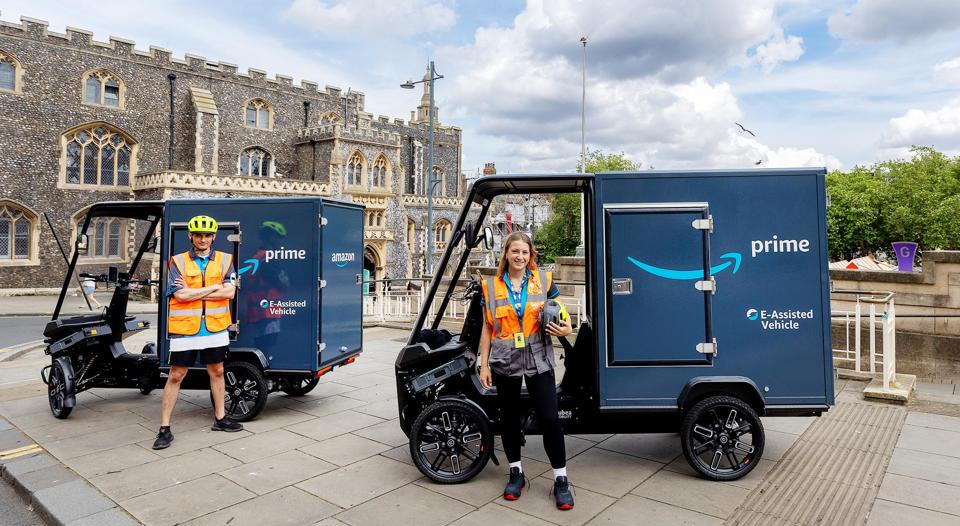Amazon has accelerated the roll out of electric cargo bikes across the UK as part of a micromobility hub strategy which underpins its pledge to decarbonise its transportation network.
The company is investing £300 million over five years (2022-2027) to electrify and decarbonise its UK fleet with solutions including electric vans and trucks, e-cargo bikes and delivery walkers. It anticipates that electric cargo bikes and walkers have the potential to make around 2.5 million deliveries to Amazon customers every year, which will help take traditional delivery vans off city roads, alleviate traffic congestion and improve air quality
Norwich is the latest site to open a micromobility hub, joining Glasgow, Manchester and Northern Ireland, as well as numerous sites in London including Croydon, Shoreditch and Wembley. The first fleet was launched in 2022 in central London and is now making thousands of deliveries a year across the ultra low emission zone.
The Norwich hub houses a fleet of new electric cargo bikes which will deliver thousands of packages per week to Amazon customers.
Danzen Logistics is a local courier company which provides delivery services to Amazon customers in Norwich.
Owner Dan Zenchuk said: “We are delighted to work with Amazon to bring this fleet of electric cargo bikes to Norwich. We think the electric cargo bikes are going to be a big hit with customers, while also supporting Amazon’s sustainability commitments, and providing additional delivery rider opportunities in the area.”
As well as traditional carriers, Amazon works with a community of Delivery Service Partners - small and medium sized courier businesses like Danzen Logistics - with thousands of individuals delivering packages to Amazon customers.
Amazon and its partners have already deployed more than 1,000 electric delivery vans across the UK and Ireland, in addition to nine fully electric heavy goods vehicles, which have replaced diesel trucks.
The company is co-founder of and the first signatory to The Climate Pledge, a commitment to reach net-zero carbon emissions by 2040.
“With more than £300 million committed to electrifying and decarbonising our transportation network over the coming years, we remain laser focused on reaching net zero carbon by 2040,” said John Boumphrey, UK country manager, Amazon.
Amazon is one of a growing number of companies investing in e-cargo bikes for final mile delivery or the transportation of lighter tools and equipment by, for example, plumbers and electricians.
London alone has seen a 63% in their use from 2022 to 2023, according to analysis by Clean Cities.
Transport for London highlights that cargo bikes could replace up to 17% of vans in parts of London by 2030.
This equates to more than 62 million miles, with carbon savings estimated to be in the region of 30,000 tonnes of CO2 a year by 2030.
Jack Skillen, director of sustainability and place at Team London Bridge, the business improvement district, said: “In this area alone, over 200 businesses have made a switch to cargo bike, whether it is for transporting legal contracts, blood samples, stationary or waste.”
However, he would like to see greater support from TfL and is urging local councils to commit to the Cargo Bike Charter which pledges to switch vans to cargo bikes where possible as well as enabling businesses and residents to use pedal power to make deliveries and provide key services.
To date, nine councils including Westminster and Lambeth have signed up to a five-point plan to improve the infrastructure for cargo bikes and support individuals and businesses to make the switch.
In addition to the carbon and air quality improvements, there are also health and wellness benefits for workers operating cargo bikes instead of driving vans.
There are also efficiency opportunities in congested cities such as London.
Research by a number of organisations claims that, in London, e-cargo bikes can deliver goods at a rate of 1.61 times faster than a van.
Moreover, e-cargo bikes have significant transformational potential: if scaled up to replace just 10% of current van mileage in London, e-cargo bikes could save 133,300tn CO2 and 190,000kg of NOx per year, as well as freeing-up 384,000 sq.m. of road and parking space occupied by vans.
Some of the more bullish estimates claim that e-cargo bikes could actually replace up to half of all van trips in the capital.
As well as investing heavily in e-cargo bikes and electric vans, Amazon is also taking a holistic approach to its decarbonisation plans by ensuring all the electricity consumed by its operations, including its data centres, is matched with 100% renewable energy. It achieved this last year, seven years ahead of its original 2030 target.
As the largest corporate purchaser of renewable energy globally and in the UK, Amazon has 29 operational on-site solar projects and enabled seven large-scale offsite renewable energy projects, with a capacity of more than 900MW in the UK.
Once all projects are operational, they are expected to generate enough energy to power the equivalent of more than one million UK homes annually.





















Login to comment
Comments
No comments have been made yet.